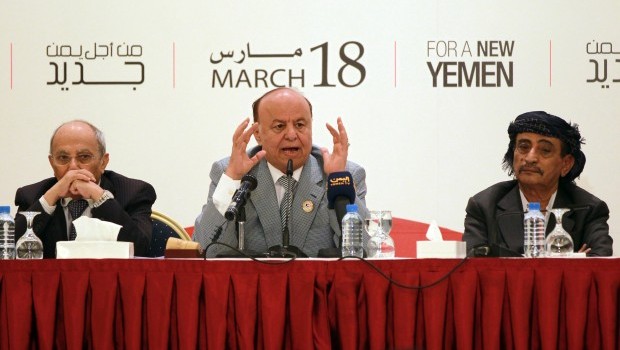
Yemeni President Abd Rabbo Mansour Hadi (C) addresses a national dialogue in Sana’a on March 30, 2013. (AFP Photo)
Sana’a, Asharq Al-Awsat—Yemeni President Abd Rabbo Mansour Hadi has claimed there are certain entities seeking to obstruct the comprehensive Yemeni national dialogue conference, which began on the 18th March. Meanwhile, the UN envoy to Yemen is continuing to meet and consult with the southern opposition figures based abroad, in order to reach an acceptable formula for their participation in the dialogue.
Yesterday, the Yemeni president chaired the eighth plenary session of the national dialogue conference, during which participating members were divided into field teams. In a speech addressing those in attendance, he said, “There are those who do not want dialogue, there are those working against it, and there are those trying to create problems and obstacles to prevent it from continuing.” Referring to recent events in Sana’a and Aden, Hadi said, “These are nothing but an indication of that. When you realize this I am sure that you will seek to ensure that any such events, in any of the provinces, do not reflect negatively on the work of the conference.” Hadi warned that the country could enter a civil war if the dialogue fails, saying, “Dialogue is the only way to spare our people from a civil war, armed conflict, and the complete destruction of all their hopes and destinies.”
Hadi then moved on to the situation in south Yemen and the bloody events that took place in the city of Aden several days ago. He accused the faction headed by former vice president Ali Salim Al-Beidh of imposing civil disobedience in Aden by armed force, and inflicting substantial damage upon the citizens as a result. He emphasized the government’s directives to strengthen police departments with teams of anti-riot units, and called on the Southern Movement to carry out peaceful, unarmed protests as usual, and not impose an armed rebellion by force.
Yesterday Aden witnessed a new wave of violent clashes between security forces and elements of the Southern Movement, amid the recent escalation of protests rejecting the comprehensive national dialogue and demanding the separation of southern Yemen. Eye witnesses and local sources told Asharq Al-Awsat that at least one person had been killed and four wounded as a result of the unrest.
Furthermore, members of the Southern Movement participating in the national dialogue conference in Sana’a have now threatened to cease their involvement. This development comes against the backdrop of the conference’s formation of 9 field teams that will work on the ground in certain Yemeni provinces to gauge perceptions and ideas regarding the dialogue’s output. A southern source participating in the national dialogue, who declined to be named, told Asharq Al-Awsat that consultations are currently underway between southern participants, particularly the opposition, in order to reach a decision about whether to boycott the conference and withdraw, or continue. The source hinted at the possibility of a solution to the problem, which stems from the Southern Movement’s representation in the 9 field teams, currently standing at less than the stipulated 50 percent. According to the source, this is “a circumvention of the rules of procedure for the national dialogue conference.”
In related news, informed political sources have revealed that Jamal Bin Omar, UN envoy to Yemen, met with three southern opposition leaders on Friday evening in Dubai, UAE. They were Abdul Rahman Al-Jifri, head of the League of the Sons of Yemen, Salem Saleh Mohammed, and Haidar Abu Bakr Al-Attas. Jifri told Asharq Al-Awsat that the leaders had agreed with Bin Omar to hold an expansive southern meeting abroad, comprising of the entire southern political spectrum, and that the international envoy will work to arrange this.
Meanwhile, Afrah Alzubh, assistant secretary general for the Yemeni national dialogue conference, has confirmed that those in the dialogue’s secretariat are of the opinion that the southerners should determine their own destiny. In comments to Asharq Al-Awsat, she said that she is not against southerners choosing any form of system they want, stressing that the northerners must reassure the southerners and not consider them as a source of wealth and land. Alzubh pointed out that the past two weeks have consisted largely of listening to what the parties attending the conference have to say, and that so far no issue has been discussed in any great depth.
Alzubh commented on what she considered to be a remarkable phenomenon, namely that for the first time the Yemenis have sat down at the dialogue table, and each party is speaking openly about issues such as Yemeni unity and its survival, federalism, and other contentious subjects that Yemenis were previously not allowed to talk about.
